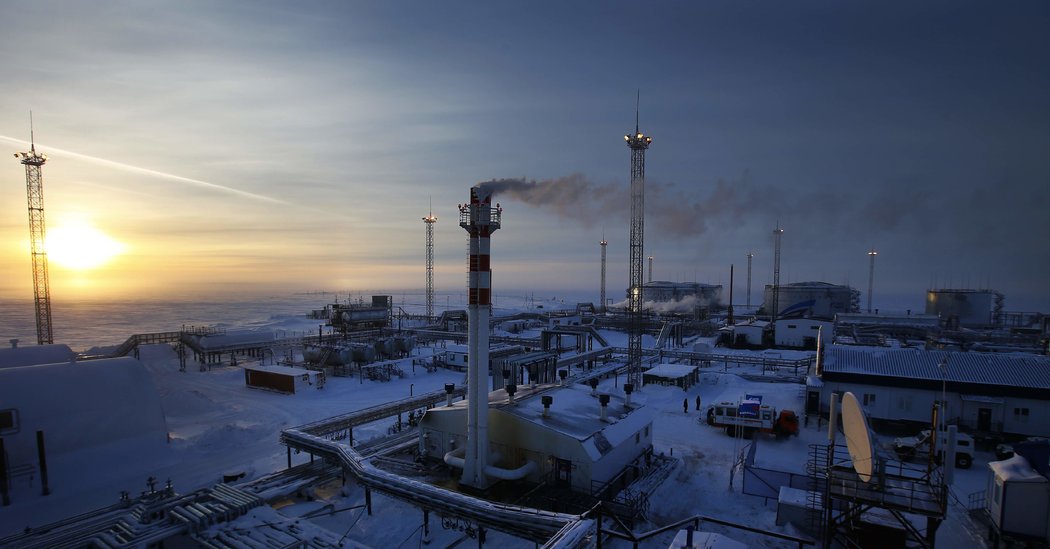MOSCOW — For most of the post-Soviet period, energy officials in Russia have resisted OPEC entreaties to participate in production cuts to help prop up oil prices, arguing that doing so was impossible because of the country’s cold climate.
This week, confronted by a gusher of unsaleable oil and no place to put it, Russian energy executives unveiled plans to reduce production by a fifth by shutting down wells, many of them in the Arctic.
Not eager to share the burden of shutdowns with OPEC, the Russian government long maintained that curtailing production was not as simple a matter for them as it was for the desert oil kingdoms. Supposedly, wells drilled in permafrost could not be shut down, lest they froze, requiring them to be drilled all over again when they were reopened.
Oil analysts have called the cold weather claim one of the global oil industry’s biggest geopolitical bluffs, one which Russian officials carried off with a straight face for decades to deflect OPEC demands for help with prices.
“It’s mostly nonsense,” Thomas Reed, a Houston-based energy investor and former executive of an oil company with experience in Siberia, said of the cold weather claim. “Generally, an oil well will shut in just fine.”
That view has been substantiated by the hurried Russian shutdown now. Siberian and far northern wells, it turns out, turn off about as easily as any others.
“The level of compliance with the deal will be 100 percent,” Russia’s energy minister, Aleksandr Novak, said in an interview with the Russian news agency Interfax on Wednesday. Moscow committed to cutting about two million barrels per day, about a fifth of its pre-crisis output.
The cuts began last week, Mr. Novak said, adding: “All the companies accepted responsibility to fulfill the agreement.”
For years after the Soviet collapse, OPEC had tried to draw Moscow into production-cutting agreements, saying Russia, the world’s largest petroleum exporting country if oil and natural gas are taken together, reaped the rewards of price support without carrying any of the burden.
Russians raised the cold-weather defense repeatedly: after the oil price collapses of 1998 and during the global recession a decade later, according to public statements.
The cold came up again in 2014 in talks in Vienna with Saudi negotiators, and in 2016 as Russia initially pushed back on a production-cutting deal with OPEC before conceding to a small reduction. Russia would not join OPEC in cuts — not to save money, but because of Siberia’s notoriously chilly weather, officials said.
“We cannot work as OPEC does,” said Igor I. Sechin, head of the Russian state oil company, Rosneft, at International Petroleum Week in London in 2016, citing private ownership of oil companies in Russia before getting on to the cold. Temperatures at Russian fields sometimes dropped to 58 degrees Fahrenheit below zero, he noted. “We’ve tried to explain that to our OPEC friends,” he added.
There is little doubt that the Russian cold poses a special set of problems, industry experts say, though nothing is insuperable.
Some Russian oil is naturally saturated with paraffin wax and warm enough to flow. At the surface, the wax is separated from the oil and dumped in huge mounds around the fields. The pipes in these fields would need to be drained before a shutdown, lest the wax congeal into the world’s longest candle.
In many other Russian wells, engineers extract the crude by pumping water through hundreds or thousands of feet of permafrost to create pressure, forcing the oil to the surface. In shutting down the well, engineers must ensure these water columns don’t rise into the permafrost layer.
These plumbing problems, however, are offset by a broad benefit gained by closing down an oil well: with nothing being taken out, pressure in the reservoir tends to build up, oil analysts say. When the wells are eventually uncorked, they produce more than when they were shut in.
In fact, in the Russian industry, as elsewhere, geologists routinely close one or several wells in a field for what are known as pressure buildup tests. No harm is done.
“I don’t really expect a lot of problems,” said Aleksandr Burgansky, an oil analyst with Renaissance Capital, a Moscow investment bank. “Oil companies know how to do it.”
Even before the coronavirus pandemic collapsed demand for oil, revealing that Russia could indeed shut production, the Saudis had grown skeptical of Russia’s argument about the cold. In 2014, the Saudi energy minister at the time, Ali al-Naimi, walked out of a meeting after Mr. Sechin said that Russia could not cut production, according to Mr. al-Naimi’s memoir, “Out of the Desert.”
Michael Lynch, a fellow at the Energy Policy Research Foundation in Washington, said in a telephone interview that the Russians “have always made the argument, ‘we need time to cut things back.’ ”
“I think that’s 90 percent rationalization,” he added.



